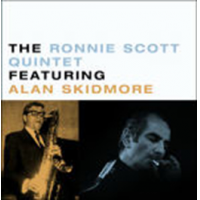Home » Jazz Articles » Album Review » The Ronnie Scott Quintet Featuring Alan Skidmore: The Ro...
The Ronnie Scott Quintet Featuring Alan Skidmore: The Ronnie Scott Quintet Featuring Alan Skidmore
As the title indicates this was Scott's band, but Skidmore was the up and coming new kid on the block—just 23 years old, a mere stripling compared to the 29-year-old leader. The younger man was the son of another fine British saxophonist, Jimmy Skidmore and was already carving out a reputation as a stylish player by the time he made this recording. His career is now over half a century long and includes work with Van Morrison, Michael Gibbs, Chick Corea and Sonny Boy Williamson II. Scott was no slouch, either: his partnership with Tubby Hayes in the influential Jazz Couriers a few years earlier was another example of a two tenor frontline.
This vinyl EP—recorded at a BBC Jazz Club session which was broadcast on 27 March 1966—may only be 27 minutes long but they are 27 highly impressive minutes. The fiery twin-tenor frontline is matched by a powerful rhythm section of pianist Gordon Beck, bassist Jeff Clyne and drummer Johnny Butts, a.k.a. the Gordon Beck Trio.
Sonny Rollins' "Oleo" kicks off with tight and punchy unison playing from Skidmore and Scott then rushes along at a fast clip—Beck's fingers hurtling over the keyboard during his solo. "A Night In Tunisia" is also a flyer: this time it Beck's turn to solo with speed and precision. "Sonnymoon For Two," another Rollins composition, gets a similar unison introduction before Scott and Skidmore trade solos over Clyne and Butts' driving rhythm and Beck's well placed piano chords. Beck's own solo mixes single note runs and percussive chords imaginatively.
It's not all fire and hyper-fast tempos: to suggest that it is would be to diminish the players' talents. Scott's "The 1612 Overture"—a nod to Pyotr Ilyich Tchaikovsky and a reference to the tune's 16 bar/12 bar structure—is taken at a more moderate tempo, giving Clyne a chance to solo with more emphasis on dynamics than speed. "Where Are You" (also recorded by Rollins) shows that the quintet could deliver a ballad with grace and subtlety.
The sound quality of this 50-year-old recording is exceptional: a testament to the BBC studio crew as well as to Gearbox Records' team. Sadly, of the quintet of musicians only Skidmore is still alive—Butts died only months after the session was recorded. The Ronnie Scott Quintet Featuring Alan Skidmore is a fine reminder of a talented bunch of players from a scene that may not have been at a commercial peak but which could still lay claim to imaginative and at times exceptional musicianship.
Track Listing
Oleo; The 1612 Overture; Where Are You?; Sonnymoon For Two; A Night In Tunisia.
Personnel
Alan Skidmore
saxophoneRonnie Scott: tenor saxophone; Alan Skidmore: tenor saxophone; Gordon Beck: piano; Jeff Clyne: double bass; Johnny Butts: drums.
Album information
Title: The Ronnie Scott Quintet Featuring Alan Skidmore | Year Released: 2013 | Record Label: Gearbox Records
Comments
About Alan Skidmore
Instrument: Saxophone
Related Articles | Concerts | Albums | Photos | Similar ToTags
For the Love of Jazz
 All About Jazz has been a pillar of jazz since 1995, championing it as an art form and, more importantly, supporting the musicians who create it. Our enduring commitment has made "AAJ" one of the most culturally important websites of its kind, read by hundreds of thousands of fans, musicians and industry figures every month.
All About Jazz has been a pillar of jazz since 1995, championing it as an art form and, more importantly, supporting the musicians who create it. Our enduring commitment has made "AAJ" one of the most culturally important websites of its kind, read by hundreds of thousands of fans, musicians and industry figures every month.





















